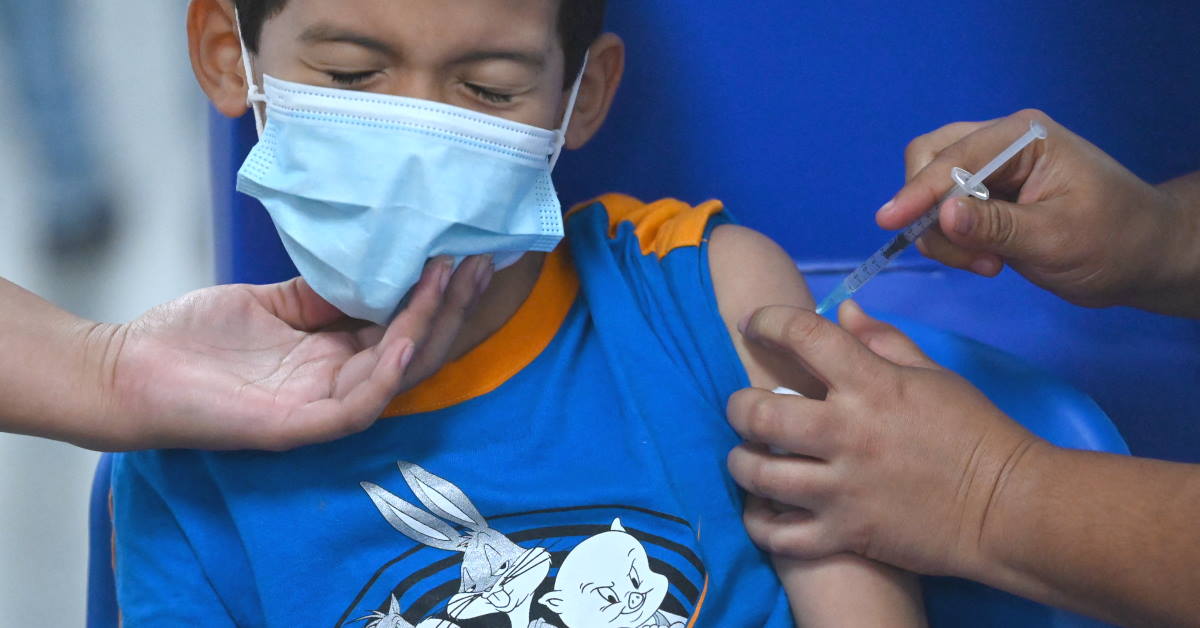Pfizer on Thursday requested emergency approval from United States (US) health authorities to use its COVID jab on children aged five to 11.
Here is a look at different approaches to vaccinating children against the virus and the debates it has launched around the world.
What Changes Are Made For Children?
Pfizer tested its jab on more than 2,000 US children aged five to 11 and submitted results to the US Food and Drug Administration (FDA) for approval.
The dosage for children in that age range is a third of what it is for adults: 0.1 mL rather than 0.3 mL.
Pfizer and BioNTech say children in trials reacted well to the vaccine and that their immune response was "robust" and "comparable" to that observed in older adolescents and young adults aged 16 to 25.
If the FDA grants authorisation when it convenes on October 26, children in that age range – of whom there are some 28 million in the US – could start getting vaccinated by the end of the month.
Are Other Countries Doing This?
While many countries have begun vaccinating adolescents aged 12 and older very few have extended jabs to children younger than that.
On 15 September Cuba began administering doses of its Abdala and Soberana vaccines – which are not approved internationally – to children aged two to 11 years.
Also, in mid-September Cambodia began vaccinating kids aged six and up with the Chinese Sinovac jab.
Sinovac has been approved for adults in more than 50 countries but before Cambodia only China had authorised its use in children over three.
Sinovac has also launched clinical trials of its jab in 14,000 children aged six months to 17 years old in Chile, Kenya, Malaysia, the Philippines and in South Africa.
In early August the United Arab Emirates started offering Sinopharm, another Chinese jab, to children aged three to 17.
Venezuela announced in September that it would start vaccinating children and adolescents aged three to 18 in October.
In Israel children aged five to 11 with complicating health factors – such as chronic lung illnesses, autoimmune diseases or neurological problems – have been able to get vaccinated since the end of July.
What Is The Argument Against?
Arnaud Fontanet, an epidemiologist advisor to the French government, said that the major question is whether the risk posed by COVID to children in this age range outweighs the risk of potential jab side effects.
For children in America the threat of severe COVID is elevated, he said.
"The risk of hospitalisation for an infected child there is 10 times higher than for a child in western Europe," he said, citing the prevalence of pre-existing conditions like obesity and diabetes.
Fontanet said that in southern US states where vaccination rates are low, paediatric services in hospitals are stretched thinly.
The situation that could push US authorities to quickly approve jabs for younger children.
Will More Kids Get Jabs?
The last few months have seen the World Health Organization (WHO) hammer home the importance of getting poorer adult populations vaccinated before extending jabs to children in rich countries.
In its global vaccine strategy published on Thursday, the WHO said whether young children need to get jabs depends on how the virus evolves and on proven vaccine safety in that age group.
Fontanet says western European countries will be "much more hesitant" than the US to lower the age range for vaccination.
He cites current data that shows infections are relatively benign in children aged five to 11, even with the now-dominant Delta variant.
Vaccination rates among the elderly are also rising, he added, which reduces the risk of that fragile population being contaminated by infections in young children.
Fontanet also notes that parents of children in that age group tend to show more resistance to vaccines.
"We always expect parents to be a little more hesitant," he said.
Getting millions of American children jabs means an opportunity to observe any side effects that may have escaped detection in clinical trials.
"It's really in our best interest to not rush and look at the data that will come from large-scale vaccination of children in the US," Fontanet added. – AFP
